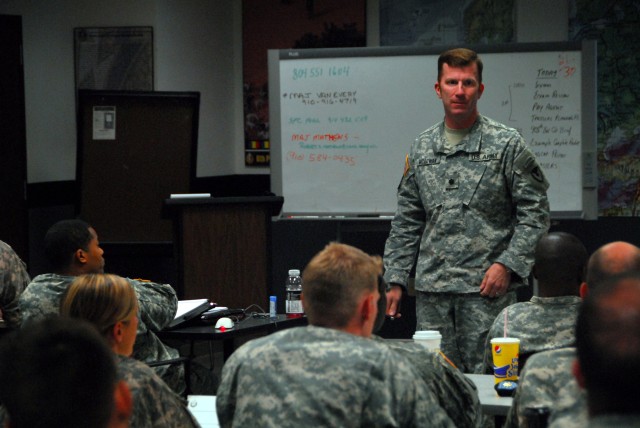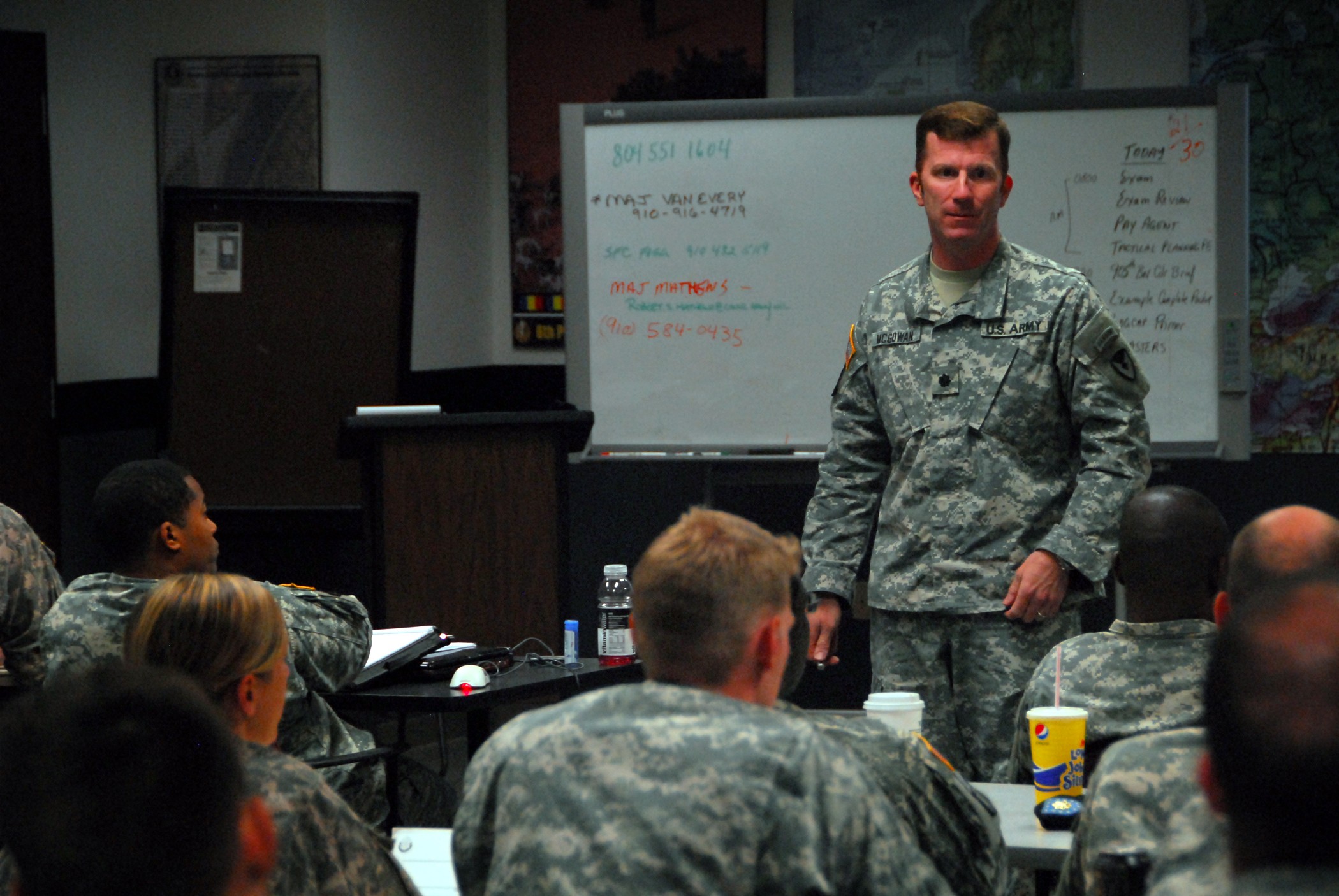
FORT BRAGG, N.C. (USASOC News Service) -- More than 50 U.S. Army Special Operations Command Soldiers finished up a new two-week contracting support course designed to enlighten them on procedures for establishing and managing contracts in a deployed environment.
The Operational Contracting Support Course, normally designed to train brigade staff officers in contracting support planning and management, was taught to psychological operations, civil affairs and special forces Soldiers in two classes over a two-week period.
Retired Lt. Col. Robert Gould, a former contracting officer and the instructor of the course, came from the Army Logistics University at Fort Lee, Va., at the request of the 4th Psychological Operations Group (Airborne) to present the information to the USASOC Soldiers.
"This course is not for contracting officers, but instead for the brigade-level staff officers of operational units, or any other individuals who may handle contracts," Gould said. "Of course, we had to tailor it somewhat to the USASOC audience, to gear it for smaller four or five-man teams."
Many of the students in the course, which was the first of its kind taught to USASOC Soldiers, were part of military information support teams. These teams, which usually consist of four Soldiers or less, deploy independently to foreign nations and work alongside the U.S. State Department in embassies around the world.
"These Soldiers are taught how to integrate contracting into their military decision-making process," he said. "So at the end of the day, the need for contracting isn't a surprise and will be an integrated effort which was planned for, not a last minute idea."
Gould said the course is gaining momentum. So far he has instructed nine classes graduating around 150 people from the course. Week one consists of classroom instruction, and during week two, students participate in a hands-on practical training exercise.
"This course was created in response to the Gansler Commission back in 2007," Gould said. "Once these Soldiers graduate, they are capable of doing everything from writing a statement of work and filling out funding documents, to managing contracts and contracting officer representatives."
Once these Soldiers graduate the course and head overseas, they should not feel alone when it comes to contracting support, said Lt. Col. Dennis McGowan, the commander of the 905th Contingency Contracting Battalion.
Contingency contracting teams of the 905th are aligned to USASOC for the purpose of providing operational contracting support and training. The unit is increasing in capability and has been gaining visibility throughout USASOC since it stood up in October 2009.
The 905th is a subordinate command of the U.S. Army Expeditionary Contracting Command.
"Every single day we're answering the phone with an issue here or there," McGowan said. "The Army makes contracted support available to units, but we've never taught them the specifics of how to use it."
That's where the importance of OCSC comes in.
"This would be good training for any USASOC Soldier directly involved in contracts, whether they're Special Forces, Civil Affairs or PSYOP," he said. "Much of the time the end result of civil affairs and PSYOP missions is brought to bear through contracting. For example, television or radio airtime, or hard copy products for the PSYOP guys, or some sort of construction project for civil affairs."
"Our Soldiers and teams often deploy to austere environments where the support structure is extremely limited, and contracting is a vital means in assisting with our development and distribution of PSYOP products to support the mission," said Col. Carl Phillips, the 4th Psychological Operations Group commander.
With such new information being presented to the Soldiers, who often rely on specific U.S. embassy procedures to establish contracts, there were bound to be questions.
"The biggest question I get is, 'How do I get contracting support'" McGowan said.
His advice was to try and solve the problem locally first, as nothing happens in a country without the U.S. ambassador's approval. However, he assured all of the students he is just a phone call or an email away.
"The 905th is USASOC's operational contracting support provider and advocate," he said. "We may not always be the ones to provide your support, but we will find the right contracting office to support you. We will make sure USASOC receives the operation contracting support they need."
As McGowan and Gould begin to receive positive feedback from the students and others within the PSYOP community, there is interest in incorporating some of the contracting support training into the psychological operations advanced individual training at the U.S. Army John F. Kennedy Special Warfare Center and School.
"The lessons in this course are incredibly valuable and given the nature of our mission, should at least be introduced in the pipeline," said Capt. Sherri Fazzio, a tactical PSYOP team leader from 9th Psychological Operating Battalion and one of the students in the course.
With word spreading about the importance of the course, McGowan said it is likely OCSC will become an annual or even bi-annual training opportunity for USASOC Soldiers.

Social Sharing